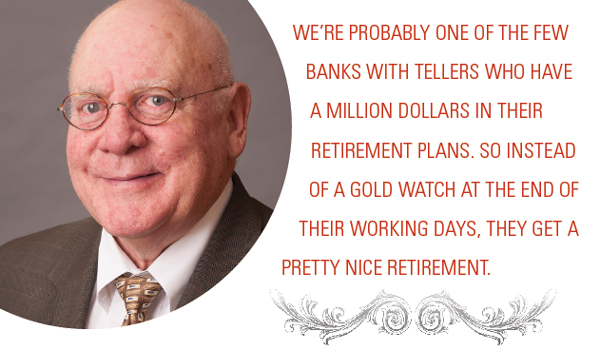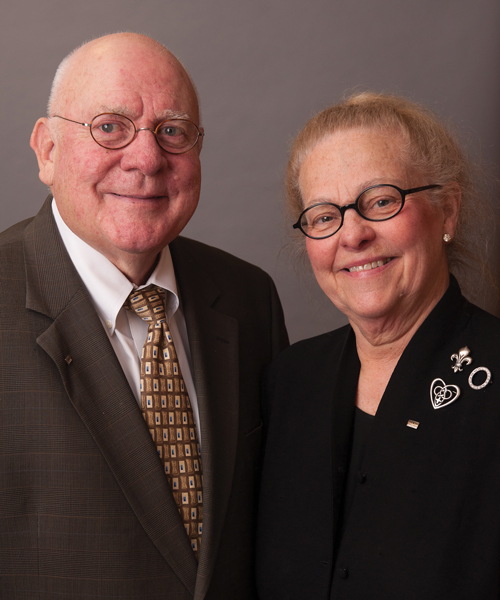
The employees of Hometown Community Banks call them “mom” and “dad,” and for good reason: together, they exemplify nurture and development. The parents of two and grandparents of four, Jean Ann and Gordon Honegger say they have some 475 more of their own—and they “treat them all alike,” rewarding hard work and encouraging individual and collaborative growth.
Over the last 40-plus years, they’ve grown Morton Community Bank (MCB) from a single location with $7 million in assets to 38 locations and $3.3 billion in assets. Last year, it was the most profitable bank in Illinois, south of Chicago—a staggering achievement. The Honeggers call it the best of both worlds, serving up modern amenities (like a mobile app and online bill pay) with old-world charm (friendly tellers and its iconic clock-tower exteriors).
As chairman emeritus of MCB and co-chairman of the bank’s holding company, Hometown Community Bancorp, Inc., Gordon joined the bank in 1973; Jean Ann, co-chief executive officer, joined him four years later. Despite its growth over four decades, the bank’s motto has remained unchanged: share the success—also a cornerstone of the Honeggers’ personal philosophies.
Born in the same Forrest, Illinois hospital just over a year apart, the Honeggers are hometown sweethearts, fused by a shared passion to give back to the community. Both graduates of Forrest-Strawn-Wing High School, Gordon holds a B.S. in business administration from the University of Illinois, an MBA from Northwestern University and a PhD in agricultural economics from Purdue University; Jean Ann earned an education degree from ISU and a master’s degree in counseling from Purdue.
Residents of Morton since the ‘70s, the Honeggers’ combined community service has touched a multitude of lives. Both through the bank and personally, they have supported and served a range of causes—including the Rotary Club of Morton, Morton Community Foundation, The Salvation Army, W.D. Boyce Council, Morton Chamber of Commerce, Optimist Club and the United Way—as well as a catalogue of sponsorships too numerous to list. For their dedication to the community, the couple received the 2008 Distinguished Service Award from the Morton Chamber of Commerce and the Morton Venture Award from the Morton EDC in 2011.
Gordon, tell us about your father’s farm in Forrest, Illinois. What did you learn growing up that you still use today?
Gordon: It was a large egg farm. The sign going into Forrest was “Egg Capital of the World!” and that’s no yolk! (pauses, smiling) It was egg-type chickens, as opposed to broiler-type. There were only eight brands in the world, and we had one of them: Honegger Layers. That breeding stock was sold around the world. [Eventually], my older brother took over the business, and the business was sold 25 years ago… [I learned] hard work and concentration. Integrity. And hard work. (laughs) And innovation. I like to invent things—new products.
So how does one goes from studying agricultural economics to banking?
Gordon: Well, a lot of banking is economics, so that came in handy. And my dad was a successful agribusiness person—
Jean Ann: You had a lot of experience in business back then.
Gordon: He had an eighth-grade education, but he brought me into the boardroom early on, and I just kept going to school.
So you like to invent… What have you invented that’s new in the banking world?
Gordon: We invented a savings account that paid 15-percent interest, insured, back in the ‘80s when banks were prevented from paying more than five-percent insured. The investment houses could pay 18-percent uninsured, but everybody wanted insured. It’s a long story, but I wrote a book on it and sold the book around the country. So that was my claim to fame—a new product. [The book is] called MIMMA—Mid-Illinois Money Market Account. It was a private book, but all the big banks wanted it… I think there’s a newspaper story where Chase Manhattan Bank wanted a copy of it [right away], so I was running down Main Street chasing the Federal Express truck to get it to New York the next day.
How did you come up with the idea?
Gordon: I was at a bank meeting in Arizona, and a buddy of mine and I figured it out. It’s a pretty complicated story… It was called disintermediation, where deposits were flying out to the brokerage houses back in the ‘80s, but our bank grew. We had one direct-mail piece, which you [typically] get about half a percent response rate… We got a 30-percent response, and half the people had a check in the envelope because nobody else had that product. So, it was fun.
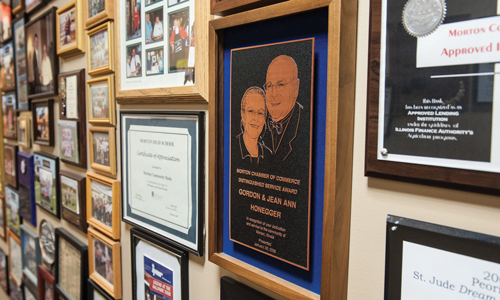
Jean Ann, you studied English and education. That’s a world away from banking…
Jean Ann: Well, yes, but then later at Purdue, I was in guidance and counseling. That ties to banking. My love is HR. I still do a lot of that here.
How long did you teach?
Jean Ann: I taught high school English for three years in a farming community right outside Lafayette, Indiana when we were at Purdue. I loved those kids. In fact, I just got an invitation—the senior class I taught is having their 50th class reunion. They looked me up somehow on the Internet. A letter came: “I’m not sure if you’re the Mrs. Honegger…” (laughs) It was a busy time—I was earning my master’s at the same time I was teaching.
Tell me about Morton as a community... Why have you stayed?
Gordon: I just came from our Morton Chamber’s Progress Report this morning, and they talked about the great water system we have… and the park district. We got into banking because we can do charity work as well as make money. My dad made money, but I didn’t want to follow in his footsteps. I wanted to be in a community where we could give back. For example, there’s a brand-new softball diamond at Birchwood [Park], and our clock tower [scoreboard] is going to be outside in center field.
Jean Ann: This one is for girls’ softball. Before that, we built one on Veterans Road for the boys.
Gordon: We’re also sponsoring Titanic: The Artifact Exhibition that’s coming [to the Peoria Riverfront Museum]. Banking gives us an opportunity to give back to the community.
Where does this passion to give back come from?
Gordon: We grew up in giving families. We don’t live very fancy. We still have a $60,000 house, though it does have a swimming pool (smiles).
Jean Ann: I came from [a similar background]. Gordon’s chicken farm was on one side of town, and I was on the other. My parents had a dime store and a custard stand, so I grew up in business just like he did.
Gordon: Her last name was Martin, and they had a sign coming in from the north end of town: “Hot, tired, sad or flustered? Try a Martin’s giant custard!” (laughs). So, she had the custard stand and I had the egg farm.
Jean Ann: As kids growing up, we worked, but we played too. And we had good friends—it’s a small town.
Gordon: So if you’re halfway sharp, you’re on the football team, the student council and you give the graduation speeches… you do everything. You get a big ego growing up in a little town like that. Then you go to the big university and get shot down.
Jean Ann: (laughs)
Why did you decide to stay here in central Illinois?
Jean Ann: I think it’s the people. We call this a family bank.
Gordon: A huge part of the bank is owned by the employees. It’s called an ESOP [Employee Stock Ownership Plan]. We’re probably one of the few banks with tellers who have a million dollars in their retirement plans. That’s reality, because they’ve been here 25 years. So instead of a gold watch at the end of their working days, they get a pretty nice retirement. Jean Ann: And the people here in Morton—you get to know them. We just think it’s a unique town. It’s clean and wholesome; the schools are wonderful. You just feel it, being here all this time.
How do you prioritize your donations?
Gordon: We like to reinvest in people who are very efficient. One of the better charities around is Midwest Food Bank. We like them.
Jean Ann: And We Care, here in town.
Gordon: (chuckles) We’re almost like a public library… We have people come by and say, “Oh, by the way, I’m with this organization and I need this…”
Jean Ann: Every day!
Let’s talk a bit more about the bank. Tell me about some of the biggest challenges—and favorite moments—over the last four decades.
Gordon: Well, in the ‘80s when Cat was on strike… interest rates were 21 percent. That was a tough period. We’ve had 40 years of increasing success, but you had to bear down during those times. The ‘80s were tough.
Jean Ann: We did okay. We’re both very positive, as you can tell. Every day, I look forward to getting up and going to work.
Gordon: And when we grow and can help other people. A lot of our employees come from other institutions that we’ve merged with.
Jean Ann: People like to come and work for us. (smiles)
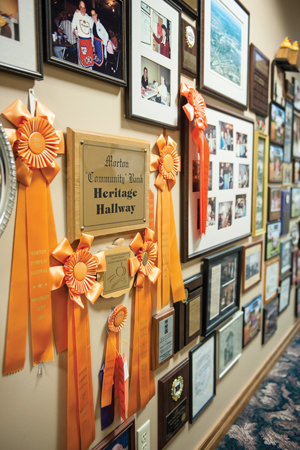
So is growth your end goal?
Gordon: We have nine goals, and one of them is growth. The others are: service to the community, happy employees, happy stockholders, happy regulators, profits, succession, the economy and efficiency. We’re one of the most efficient banks. A typical bank has an efficiency ratio of 60, maybe 70 percent; ours is 48 percent… [Higher efficiency ratios indicate less efficient banks.] When I started, we had seven employees and $7 million. Now we’re $3.3 billion, and we have $8 million for every employee. We’re 400-plus full-time employees. We’re very efficient.
Jean Ann: We watch what we spend, and we spend wisely. We’re careful about to whom we donate, and we save paper clips! Every detail counts. And the employees get it. It’s a natural thing, they’re owners—30 percent of the bank is owned by the employees.
You recently acquired Heritage Bank of Central Illinois. How do you maintain that small-town feel as you continue to grow?
Jean Ann: Our banks are named after the town they are in, and we keep those employees there… We don’t believe in just moving people around, because they know the customers. [We want] the same teller [to] take your money and cash your check the way you want it, and the way it’s always been (smiles). I think that’s most of our success.
Gordon: And we have good communication, and we celebrate. Like tomorrow night, we’re having a birthday party for everyone who has a birthday [this month] at a local restaurant. Order anything you want. So everybody gets to meet different people they don’t normally see.
How do you bring that culture into your new locations?
Gordon: Well, we have ESOP events where we talk about what it means to be an owner.
Jean Ann: And we bring the employees here or to the other banks to learn how we do our teller system, our new account system... And then we have our people at those banks mentoring to make sure they understand our culture and how we do business.
Gordon: Another thing we do is decentralize. For example, our HR department is not here; it’s in one of our other locations. Our collection department is in another location. And our accounting department is in another location, so we don’t pile everything up at headquarters.
What’s it like to work together for the same bank?
Gordon: Jean Ann got into the bank because I didn’t see her that often—because I was working so much.
Jean Ann: (laughs)
Gordon: So she came into the bank, and now I see her less!
Jean Ann: He has always been more on the loan side, and I’ve always been on the operations side. That’s how it worked. It’s just so easy. And we always talk. I think a lot of people in the same business try not to talk at night.
So, there’s no separation between work and home?
Jean Ann: No. We’re the “mom” and “dad” of the bank. (smiles)
And how many years have you been married now?
Gordon: Since 1964—52 years this year.
What’s your secret?
Gordon: We took that many cruises together.
Jean Ann: We love vacations. That’s where the pictures come from (pointing at framed photographs around the bank). We were in Europe for three months on our honeymoon… but we knew each other from the start. We started in the same culture, from the same hometown, same background, everything.
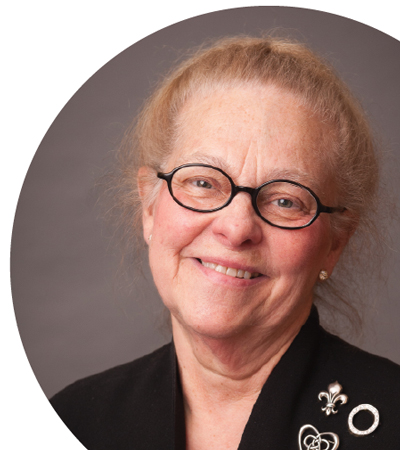
Tell me more about your passion for photography, Jean Ann.
Jean Ann: I started taking pictures because of our kids, but I should go back further than that. My grandpa and my dad and everybody liked taking pictures… I’m self-taught, too. But when Andy was born, I really started taking pictures.
Gordon: It really took off with Snuggles the kitty. She took a nice picture of our cat, and won a 4H contest down in Pekin. The Peoria Journal Star printed it, and somebody called up… saying they wanted the worldwide rights to this picture. Well, it ended up on postcards and posters all across the country. She ended up being on a couple radio stations.
Jean Ann: They wanted me to take the kitty to New York, to be on TV! I didn’t.
Gordon: And the funniest thing—I went to the grocery store and saw one of those [tabloids], and it said something about a Morton woman. I turned the page and it says, “Morton woman gets rich on cat photo!” They called up one day and wanted to talk to her about it, and I said she wasn’t here. They never called back; they just made up the story. (laughs) It’s a really cute picture.
Jean Ann: Before we moved [to this location] in ’99, I had a lot of my pictures in my office. Employees started asking, “May I have that picture for my office?” When we moved here, it was Gordon who said, “Well, let’s not just go buy pictures at a furniture store; let’s start with your pictures.” So I started enlarging more, and then I would do what an employee wants. Employees get to choose the pictures they have in their office. Some people like flowers, some like water, and cows—
Jean Ann: [My photos] are now in all of the banks. They go out as fast as we can get them done. It’s quite a process. People want to buy them, too, but I can’t sell. It’s too much work. And I’m very attached. (smiles)
How does banking in Illinois compare to banking in other states?
Gordon: Illinois is unique—it has more banks than any other state. It’s because we had unit banking, which means you could only have one bank. So all those great big banks in Chicago only had one location for years. Finally, it opened up. Part of this growth thing [at MCB] is not that we wanted to grow so much. It’s just like the chicken business when I grew up: it starts up with 100 chickens, then 1,000, then 10,000, then half a million, then a million. It’s just economies of scale. So banks are consolidating because it’s the efficient thing to do, but it takes a lot of the personality out of it. On the one hand, it’s the same industry it’s always been: you buy money; you sell money. On the other hand, it’s gotten a little more technical and a little less personal. But, we’ve gone through the ‘80s and everybody’s written off their bad loans, and banking is in great financial shape. Every quarter, there’s something called the Call Report. By law, we have to submit our financial statements quarterly for the whole world to see. And I can tell you, this last year, that we are the most profitable bank south of Chicago in the whole state—our little bank here in Morton, Illinois. We’re very proud of that.
Why are you so profitable?
Gordon: It’s good management, and that efficiency.
Jean Ann: Our special employees.
How have you faced the threat of consolidation?
Gordon: Well, as they always say at bank meetings: you can remain independent or you can grow.
Jean Ann: You can’t just stay put.
Gordon: If you’re not moving forward, then you’re moving backwards. For a lot of different reasons, banks tend to consolidate. It’s a consolidating industry because of overcapacity, while computers have endless capacity.
Jean Ann: There are too many banks! I mean, you see them on every corner.
Gordon: But that’s the story of banking. It’s a good business… [and] it’s a fun business to be in because it’s like Grand Central Station: we know everything that’s going on. We can’t talk about it, but we know what’s going on in the community—all the projects.
Do you have a philosophy at work?
Jean Ann: Treat all kids alike. That’s what we use in the HR area [for] employees and our customers, too. Gordon: I want to say, confidentiality is so important. It’s not that you don’t talk about people. You don’t talk about anything, because people assume that it might be something you got from some files… so you can’t even comment on things—
So that’s why you guys talk at home!
Gordon: (laughs) It’s tough to understand because everybody likes to talk about what they’re reading about in the paper, but you have to just not talk about it, because people won’t know you got it from the paper.
And what about mottos that you live by personally?
Gordon: “Many hands make light work.”
Jean Ann: That was your mom.
Gordon: My dad actually… “If you don’t know where you’re going, you might end up somewhere else.”
Jean Ann: Well, that’s not yours!
Gordon: Nope, that’s Yogi Berra.
Jean Ann: (laughs) I still go back to “treat all kids alike.” We did that with our two children.
For what do you want to be most remembered?
Gordon: Our ESOP. I’m really proud of the fact that we’re sharing the success.
Jean Ann: Bankers aren’t normally high-paid people. It’s the prestige when you’re a banker, in all offices. When you tell someone you are a banker, you get a nice reaction. But I think the ESOP was the icing on the cake. You can pay people more when they work harder.
Gordon: It’s about the disparity of income—it’s sad. I think in Japan, they have a certain ratio between the bottom and the top. But in America, that gets [skewed] sometimes. [With the ESOP], you can get two or three times your salary if you’ve been here 10 years. So what we’re really doing is saving for people—kind of invisibly, so they don’t miss it, but they get it in the end.
Jean Ann: Then you add the ESOP—
Gordon: And it adds up. iBi
